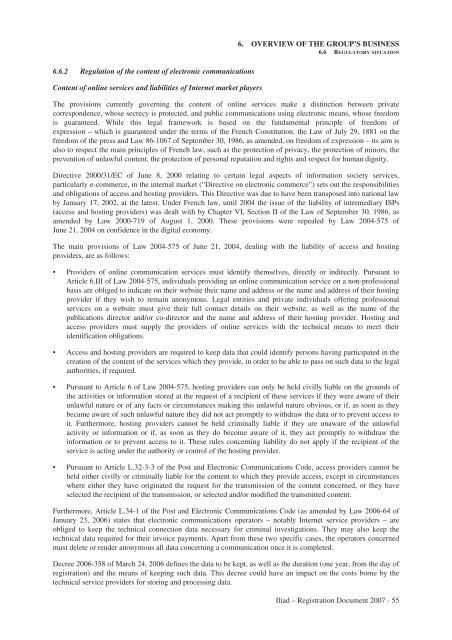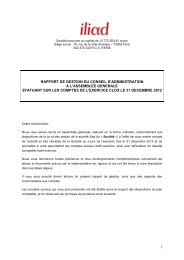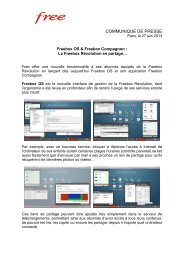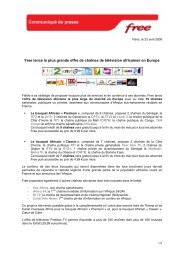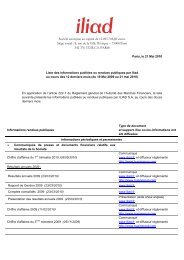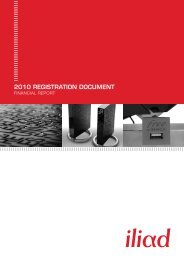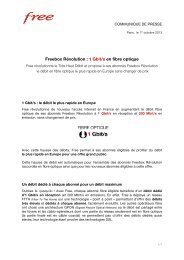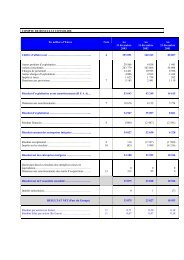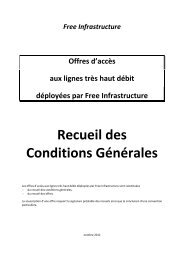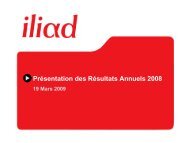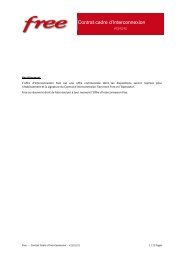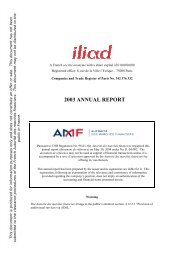REGISTRATION DOCUMENT AND FINANCIAL REPORT - Iliad
REGISTRATION DOCUMENT AND FINANCIAL REPORT - Iliad
REGISTRATION DOCUMENT AND FINANCIAL REPORT - Iliad
- TAGS
- registration
- iliad
- iliad.fr
You also want an ePaper? Increase the reach of your titles
YUMPU automatically turns print PDFs into web optimized ePapers that Google loves.
6.6.2 Regulation of the content of electronic communications<br />
Content of online services and liabilities of Internet market players<br />
6. OVERVIEW OF THE GROUP’S BUSINESS<br />
6.6 REGULATORY SITUATION<br />
The provisions currently governing the content of online services make a distinction between private<br />
correspondence, whose secrecy is protected, and public communications using electronic means, whose freedom<br />
is guaranteed. While this legal framework is based on the fundamental principle of freedom of<br />
expression – which is guaranteed under the terms of the French Constitution, the Law of July 29, 1881 on the<br />
freedom of the press and Law 86-1067 of September 30, 1986, as amended, on freedom of expression – its aim is<br />
also to respect the main principles of French law, such as the protection of privacy, the protection of minors, the<br />
prevention of unlawful content, the protection of personal reputation and rights and respect for human dignity.<br />
Directive 2000/31/EC of June 8, 2000 relating to certain legal aspects of information society services,<br />
particularly e-commerce, in the internal market (“Directive on electronic commerce”) sets out the responsibilities<br />
and obligations of access and hosting providers. This Directive was due to have been transposed into national law<br />
by January 17, 2002, at the latest. Under French law, until 2004 the issue of the liability of intermediary ISPs<br />
(access and hosting providers) was dealt with by Chapter VI, Section II of the Law of September 30, 1986, as<br />
amended by Law 2000-719 of August 1, 2000. These provisions were repealed by Law 2004-575 of<br />
June 21, 2004 on confidence in the digital economy.<br />
The main provisions of Law 2004-575 of June 21, 2004, dealing with the liability of access and hosting<br />
providers, are as follows:<br />
• Providers of online communication services must identify themselves, directly or indirectly. Pursuant to<br />
Article 6.III of Law 2004-575, individuals providing an online communication service on a non-professional<br />
basis are obliged to indicate on their website their name and address or the name and address of their hosting<br />
provider if they wish to remain anonymous. Legal entities and private individuals offering professional<br />
services on a website must give their full contact details on their website, as well as the name of the<br />
publications director and/or co-director and the name and address of their hosting provider. Hosting and<br />
access providers must supply the providers of online services with the technical means to meet their<br />
identification obligations.<br />
• Access and hosting providers are required to keep data that could identify persons having participated in the<br />
creation of the content of the services which they provide, in order to be able to pass on such data to the legal<br />
authorities, if required.<br />
• Pursuant to Article 6 of Law 2004-575, hosting providers can only be held civilly liable on the grounds of<br />
the activities or information stored at the request of a recipient of these services if they were aware of their<br />
unlawful nature or of any facts or circumstances making this unlawful nature obvious, or if, as soon as they<br />
became aware of such unlawful nature they did not act promptly to withdraw the data or to prevent access to<br />
it. Furthermore, hosting providers cannot be held criminally liable if they are unaware of the unlawful<br />
activity or information or if, as soon as they do become aware of it, they act promptly to withdraw the<br />
information or to prevent access to it. These rules concerning liability do not apply if the recipient of the<br />
service is acting under the authority or control of the hosting provider.<br />
• Pursuant to Article L.32-3-3 of the Post and Electronic Communications Code, access providers cannot be<br />
held either civilly or criminally liable for the content to which they provide access, except in circumstances<br />
where either they have originated the request for the transmission of the content concerned, or they have<br />
selected the recipient of the transmission, or selected and/or modified the transmitted content.<br />
Furthermore, Article L.34-1 of the Post and Electronic Communications Code (as amended by Law 2006-64 of<br />
January 23, 2006) states that electronic communications operators – notably Internet service providers – are<br />
obliged to keep the technical connection data necessary for criminal investigations. They may also keep the<br />
technical data required for their invoice payments. Apart from these two specific cases, the operators concerned<br />
must delete or render anonymous all data concerning a communication once it is completed.<br />
Decree 2006-358 of March 24, 2006 defines the data to be kept, as well as the duration (one year, from the day of<br />
registration) and the means of keeping such data. This decree could have an impact on the costs borne by the<br />
technical service providers for storing and processing data.<br />
<strong>Iliad</strong> – Registration Document 2007 - 55


